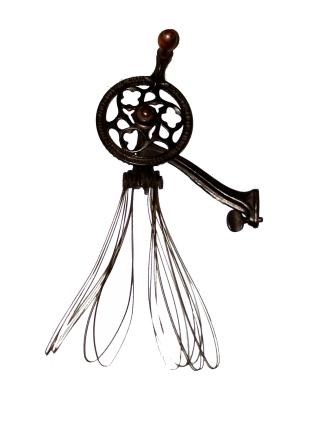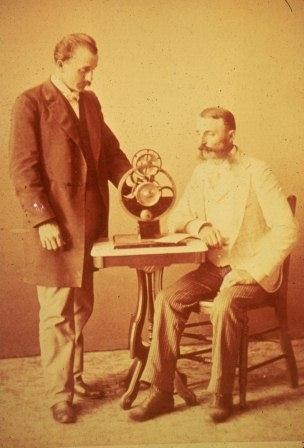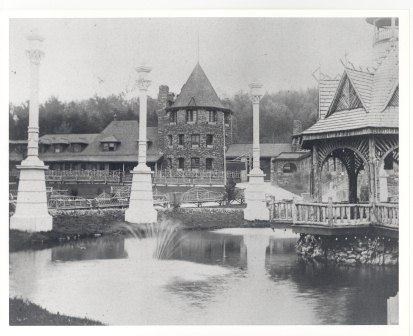
National Park Service, Glen Echo Park Photo Archives It's true! Edwin Baltzley, one of the two founders of Glen Echo, patented a new egg beater design in 1885 and it made him a fair amount of money. He partnered up with his twin brother, Edward, and together they ventured into real estate development.
Their dream was to "create for Washington and the nation a suburban place of residence equal to the historic cities of the Rhine, or the interesting towns which crown the beautiful hills of the Hudson."
In July of 1888, they purchased just over 500 acres that extended from Cabin John Creek and continued eastward along the Potomac River. They named their property Glen Echo on the Potomac.
Early in 1890, Edwin wrote an extensive illustrative brochure entitled, "Glen-Echo-on-the-Potomac: The Washington Rhine" to both promote business for the cafe resort he and Edward had built on their property and land sales for their neighboring suburban subdivision, which was one of the first for Washington, D.C. In the brochure, they acclaimed the scenic beauty and "romantic" character of the property as well as the advantages of its accessibility to the nation's capital.
Also noted in the brochure was how the Glen Echo subdivision combined "the beauties of mountain and river scenery, the charm of a mild climate, and the blessing of perfect health."

National Park Service, Glen Echo Park Photo Archives Regardless of the source of the idea, the two brothers became committed to building a citadel of culture at Glen Echo to compliment their real estate and resort enterprise.
The National Chautauqua of Glen Echo, the 53rd such assembly to be established, was incorporated in February 1891, for "the purpose of establishing and maintaining an institution of Learning to be conducted upon the Chautauqua idea and plan."
So what exactly is the Chautauqua idea and plan? Where did this whole concept originate and what exactly is it?
The Chautauqua movement grew out of an assembly first held in Chautauqua, New York, in 1874. The Chautauqua idea started out as an organized way to teach Sunday-school organization, management, and Bible-study but it rapidly drew into a summer-long school for all kinds of courses.
Imagine one of today's folk festivals combined with a summer-long camp out and a community college's continuing education program, and you have a sense of what a Chautauqua Assembly was. It was educational, cultural, high-minded, and usually a lot of fun.

National Park Service, Glen Echo Park Photo Archives And so in early 1891, active construction began at Glen Echo to embellish the natural scenery of the property and construct buildings to house the Chautauqua Assembly programs. Made primarily of stone, these buildings included an 8,000 seat amphitheater and several stone towers and structures that lined the park's entrance (see images below). To provide better accessibility to their Chautauqua and their real estate business, the Baltzley Brothers encouraged construction of the steam and electric Glen Echo Railroad, thereby establishing a direct line of transportation between Washington, D.C. and Glen Echo. 
National Park Service, Glen Echo Park Photo Archives 
National Park Service, Glen Echo Park Photo Archives 
National Park Service, Glen Echo Park Photo Archives
The first season the Glen Echo's Chautauqua Assembly was so successful, they extended the season several more weeks to accommodate visitor interest. By the spring of 1892, the electric railway system to the park was improved and the Baltzley real estate enterprise was flourishing as well.
However, in late spring 1892, just as the summer Chautauqua Assembly was to open for its second season, distaster struck in the form of a malarial fever scare. One of the professors died suddenly of pneumonia back in August of 1891 but rumors began spreading that his death was the result of malaria contracted at Glen Echo.
The malarial fever scare left the Glen Echo area with a tainted reputation. The Chautauqua program was cancelled and the buildings deserted. The sale of lots stopped, due in part to the scare and the affects of the nationwide financial panic of 1893, and without a cash flow, the sizable Baltzley enterprise was doomed.
For several years, the Glen Echo Chautauqua grounds were rented out for various activities, including vaudeville acts summer concerts in the amphitheater and as a gathering/meeting space for large groups and organizations, such as the United Daughters of the Confederacy of Maryland and Virigina (June 6-7, 1899).
|
Last updated: October 12, 2017
